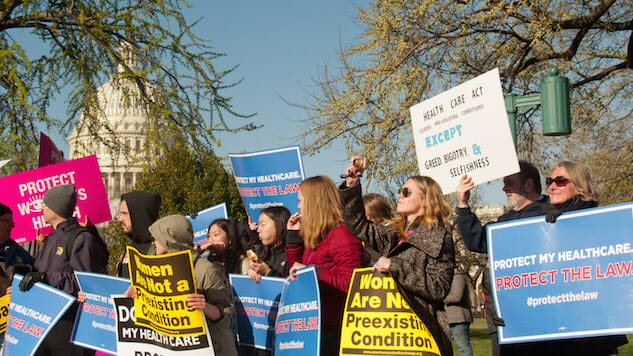What the Health? Send in Your ACA Questions to Paste‘s Insurance Expert

We have effectively taken the “health” out of “health insurance.” And we did that by commodifying and privatizing such a basic need. Health is a straightforward concept, a crucial element of human life and survival. Insurance is a cold word that intimidates and conjures confusion. People widely misunderstand how their insurance works, or even what it is—as evidenced by findings proving many Americans do not know that Obamacare and the Affordable Care Act are the same thing. Beyond that, plenty of Americans also do not realize that they have Obamacare if they have insurance that complies with the law. And with close to 20 million people now with insurance who did not have it prior to the law, it’s safe to say most of our country relies on the ACA. So repealing the Affordable Care Act without replacing it is nothing short of murder.
That’s part of what makes the Republicans loudly trying to eliminate the ACA for so many years so offensive—especially when they clearly have no concrete suggestions on what to do instead. The audacity on top of that to repeal the law without replacing it shows that there is more focus in Congress and within the new administration on undoing Obama’s legacy than on providing for the people. Thankfully at least some Republicans, in private of course, can admit that they have few original ideas, and that what they will put forth is crucial. Audio leaked by the Washington Post of a closed door meeting in Philadelphia on January 26th of Republican power proved that, with Representative Tom McClintock saying, “We better be prepared to live with the market we’ve created..That’s going to be called Trumpcare. Republicans will own that lock, stock and barrel, and we’ll be judged in the election less than two years away.” Unfortunately it takes ego and reelection for them to meaningfully consider what they’re going to give us.
Thankfully, despite the middle of the night vote-a-rama action in the Senate, and Trumps executive order on inauguration night, the law still at this point stands. Both of those moves are indicative of how unprepared, yet desperate, republicans are to repeal the ACA. But it is just that, desperation. The middle of the night senate vote was merely procedural, although it did set the stage for them to repeal major aspects of the law soon without a filibuster from Democrats. In terms of the executive order, as the Times put it, ”[it] should be seen more as a mission statement, and less as a monarchical edict that can change the law.” But they clearly are ramping up to some kind of concrete change soon, so what will happen then?
One big question are the subsidies that the ACA sanctioned—government money paid directly to insurance carriers towards your premium (your monthly cost) on the insured’s behalf. Officially referred to as Tax Credit Subsidies, as they are granted based on income brackets and age demographics, and reconciled on the following year’s taxes (if you make more money than you reported, you owe back the portion of your subsidy you didn’t qualify for; if you make less money than you reported, you get a tax credit for what you would have gotten), subsidies have allowed a majority of Americans to get insurance at a fraction or no cost. With their budget slashing in the first week of Trump’s presidency, it would seem that the subsidized premiums would be one of the first things to go. At that point, most people would have to forfeit their insurance, leaving millions exposed and uninsured.
-

-

-

-

-

-

-

-

-

-

-

-

-

-

-

-

-

-

-

-

-

-

-

-

-

-

-

-

-

-

-

-

-

-

-

-

-

-

-

-








































